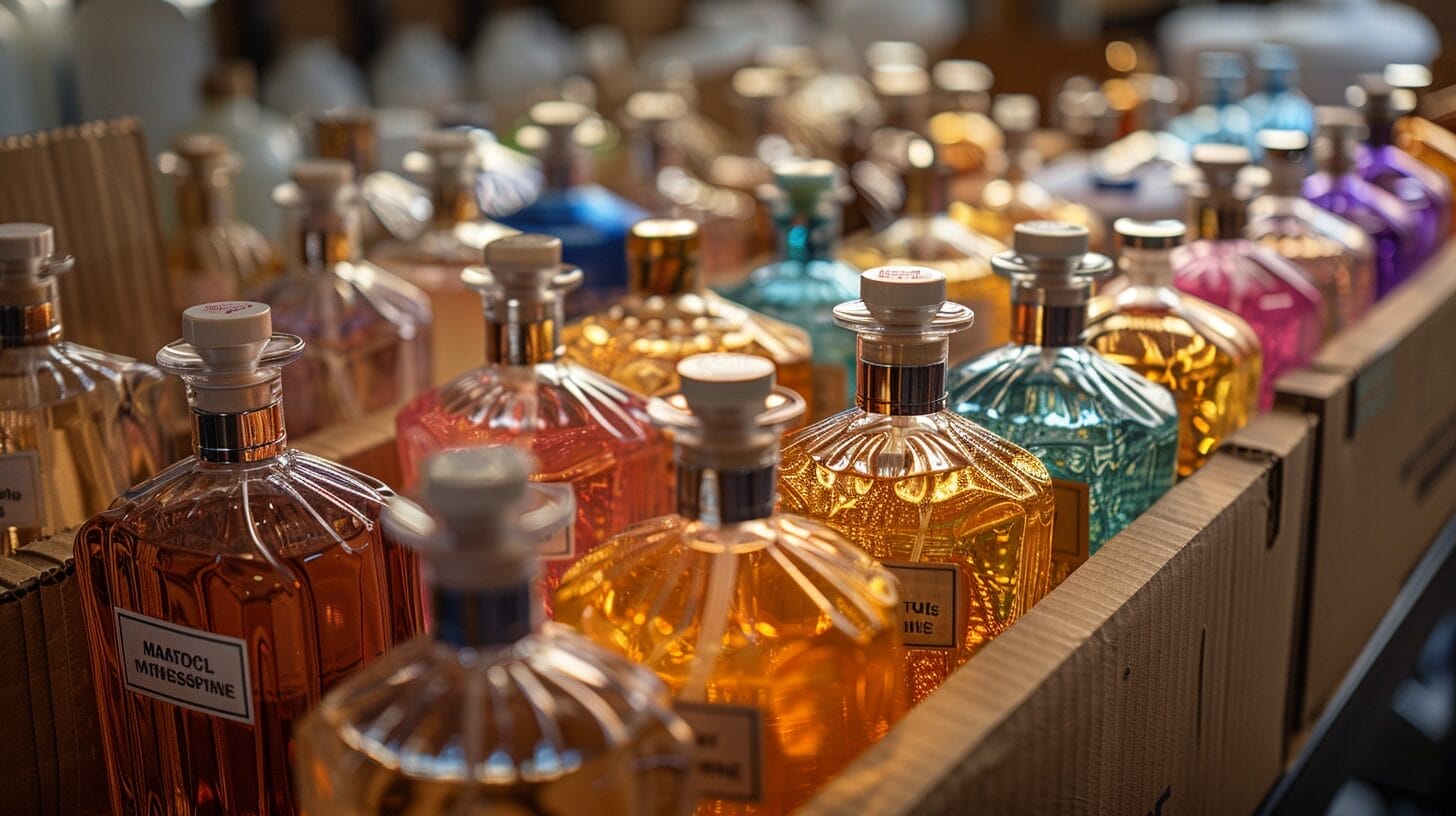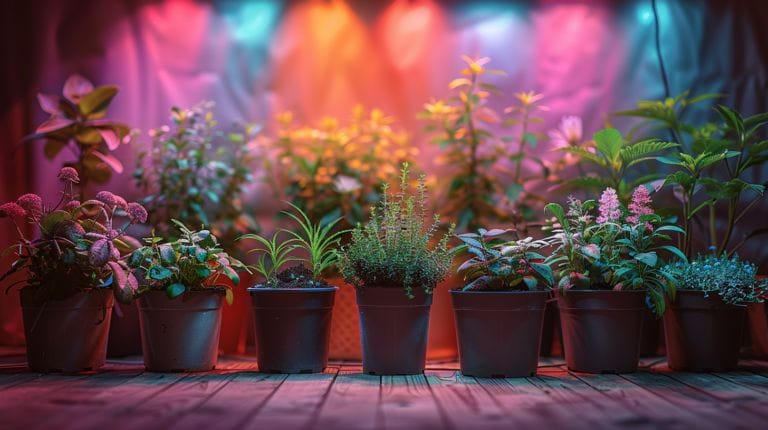Is Perfume Flammable? Understanding Shipping Rules
As we explore the intricacies of shipping perfume, one important question arises – is perfume flammable? The volatile nature of its alcohol-based composition raises concerns regarding safety protocols and regulations. Understanding the potential risks and necessary precautions surrounding the transportation of flammable goods like perfume is essential for ensuring secure deliveries. Let’s uncover the specific guidelines and precautions essential for traversing this fragrant yet potentially hazardous journey of shipping perfume.
Key Takeaways
- Perfumes contain high alcohol content, making them highly flammable.
- Flammability poses risks during shipment due to alcohol content.
- Perfume is classified as dangerous for shipping due to high flammability.
- Strict packaging and labeling requirements ensure safe transportation.
- Select carriers experienced in handling flammable goods for safe delivery.
Understanding the Flammability of Perfume and Cologne
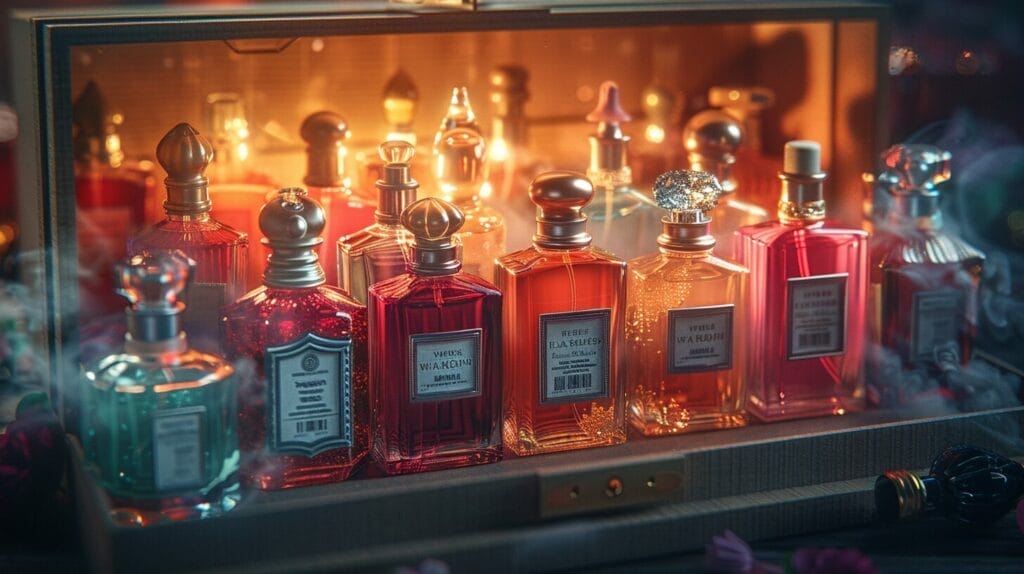
Perfume and cologne’s flammability hinges on their chemical composition, particularly the presence of alcohol. Often, perfumes contain a high alcohol content, making them highly flammable. This flammability presents a risk during shipping as any ignition source can lead to hazardous situations. The alcohol content in perfumes not only imparts their characteristic scent but also increases their susceptibility to fire.
Grasping these products’ flammability is vital to assess the potential hazards they pose. In a fire, perfumes can act as accelerants, exacerbating the flames, making them harder to extinguish. This increased flammability highlights the need for proper handling and storage during transportation to mitigate any risks.
Why Perfume is Classified as a Dangerous Good for Shipping
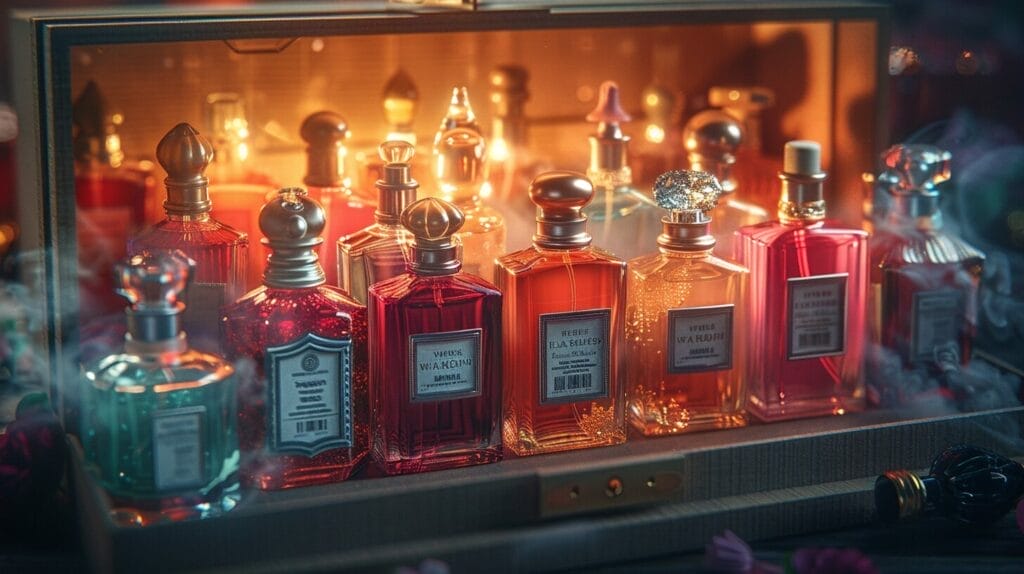
Perfume is categorized as dangerous goods for shipping due to its high flammability and chemical composition, posing significant transportation risks. Fragrances often contain a high percentage of alcohol, making them highly flammable and hazardous if not handled correctly. The alcohol content in perfume can ignite when exposed to heat or flames, leading to potential shipping accidents. Hence, stringent shipping rules classify perfume as a dangerous good, necessitating special precautions to ensure safe transportation.
Consider the following table illustrating the dangers associated with shipping perfume:
| Concerns | Risks | Precautions |
|---|---|---|
| Flammability | High risk of ignition | Store away from heat sources |
| Chemical Composition | Hazardous substances present | Proper ventilation during transport |
| Alcohol Content | Highly flammable | Use approved packaging materials |
Comprehending these risks is crucial for shipping regulation compliance and ensuring the safe delivery of fragrances. Adherence to proper handling and packaging guidelines mitigates the dangers associated with shipping perfume as a dangerous good.
Packaging and Labeling Rules for Shipping Perfume
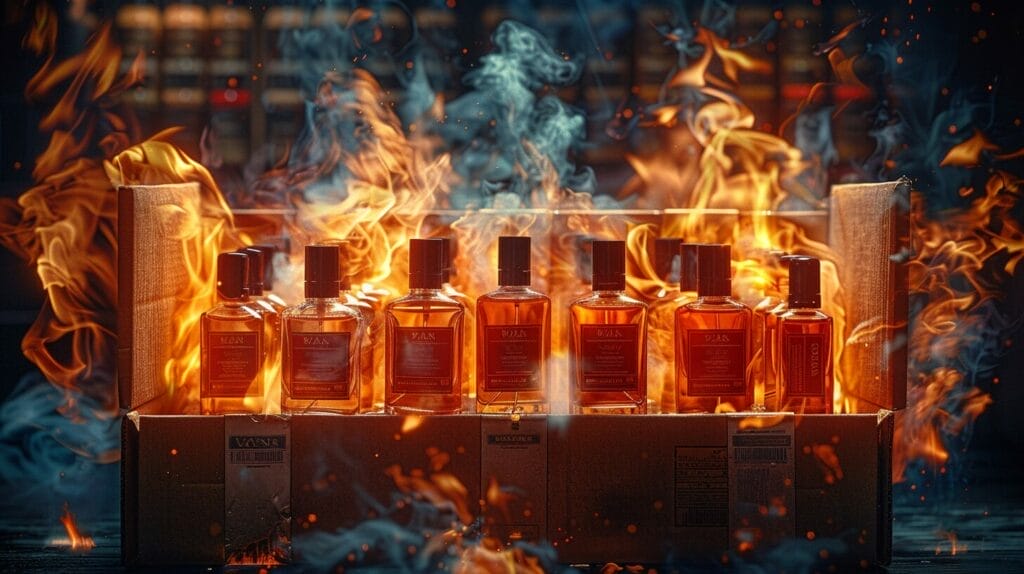
To ensure the safe transportation of perfume, strict guidelines dictate the packaging and labeling requirements for shipping flammable liquids. Packaging necessitates containers specifically designed for flammable liquids. These containers must be tightly sealed to prevent leaks during transit. Cushioning materials are also essential to protect the perfume bottles from breakage.
Correct labeling is equally vital. Each package must be marked with the appropriate label indicating its flammable liquid content. This not only ensures the safety of those handling the package but also aids shipping regulation compliance. Common perfume packaging and labeling mistakes include using inadequate containers that can’t withstand shipping pressures or failing to provide accurate labeling information.
Choosing the Right Carrier for Shipping Perfume
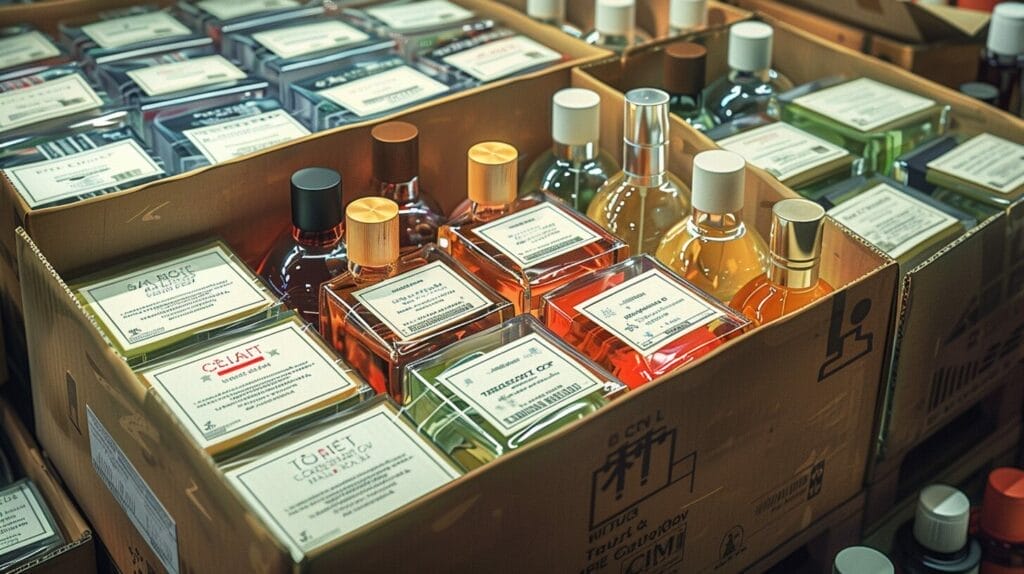
The importance of safe perfume transportation brings us to selecting the right carrier for shipping these delicate and highly flammable products. When choosing a shipper, ensure they are knowledgeable in classifying and handling flammable goods. Different carriers have varying rules and restrictions for shipping such items, so it’s important to compare and select the one that best suits your needs.
Some carriers may have specific packaging and labeling requirements, others may limit the perfume quantity that can be shipped at once. Testimonials from other businesses can provide valuable insights into using different carriers for perfume shipping. By properly vetting and selecting a carrier experienced in transporting highly flammable goods like perfume, you can ensure your products reach their destination safely and in regulation compliance.
Recommendations for Safe Handling and Transportation of Perfume
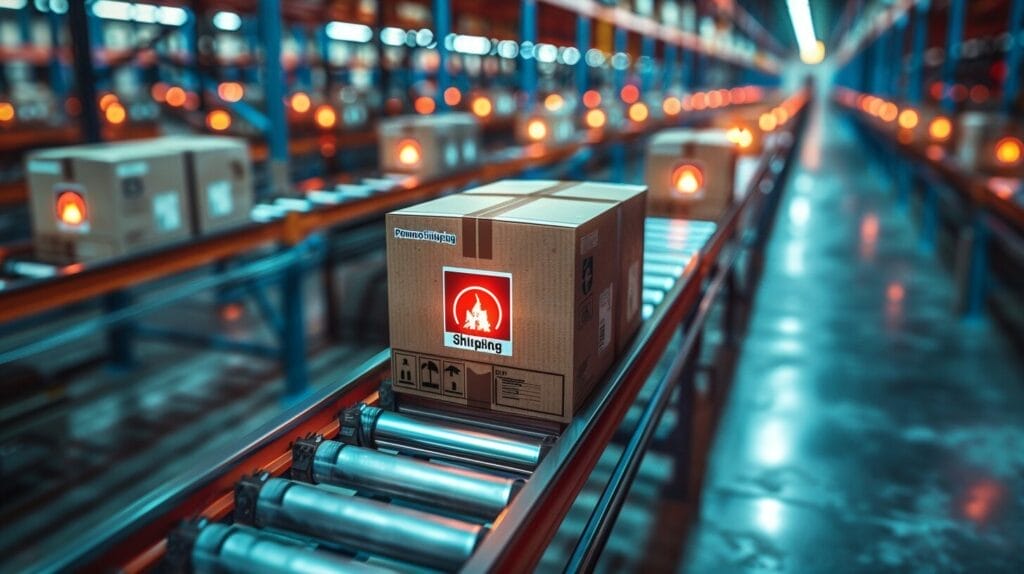
Ensuring the safe handling and transportation of perfume mandates adherence to best practices and minimizing fire hazards. Proper storage includes keeping perfumes away from direct sunlight and heat sources, as heat can increase the product’s flammability. Moreover, it’s crucial to transport perfumes in secure, upright positions to prevent leakage and breakage during shipping. Following shipping rules is paramount to ensure regulation compliance and product safety during transit.
| Safe Handling Practices | Transportation Tips | Safety Measures |
|---|---|---|
| Store in cool, dark place | Transport upright | Secure packaging |
| Keep away from heat sources | Use cushioning materials | Label correctly |
| Check for leaks regularly | Avoid extreme temperatures | Follow shipping guidelines |
Conclusion
To summarize, it’s important to recognize the flammability of perfume and follow strict shipping rules to guarantee safe transportation.
By understanding the risks involved, adhering to packaging and labeling guidelines, and selecting experienced carriers, we can mitigate potential hazards and protect both the product and those handling it.
Prioritizing safety measures is essential for the secure handling and shipping of perfume.
Frequently Asked Questions
Is perfume flammable?
Perfume is considered a class 3 dangerous good due to its levels of ethyl alcohol, making it flammable. It is important to be aware of the potential hazard and shipping restrictions.
What are the shipping rules for international perfume shipments?
When shipping perfume internationally, it is important to meet the regulations for dangerous goods and declare the contents accurately. Failure to do so may result in damage or penalties.
Why is perfume considered a dangerous good?
Perfume contains alcohol, which is flammable and can pose risks during shipping. It falls under hazard class 3 due to its flammability.
What preparations are required for shipping perfume by air?
Perfume shipments by air may require special packaging, such as outer packaging to reduce the risk of damage or leakage. It is important to follow airline regulations and guidelines.
Are there specific regulations for shipping perfume by air?
Yes, perfume shipments are subject to strict regulations to ensure safety. Employees handling these shipments should be aware of the classification and restrictions for shipping dangerous goods.

